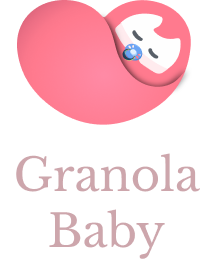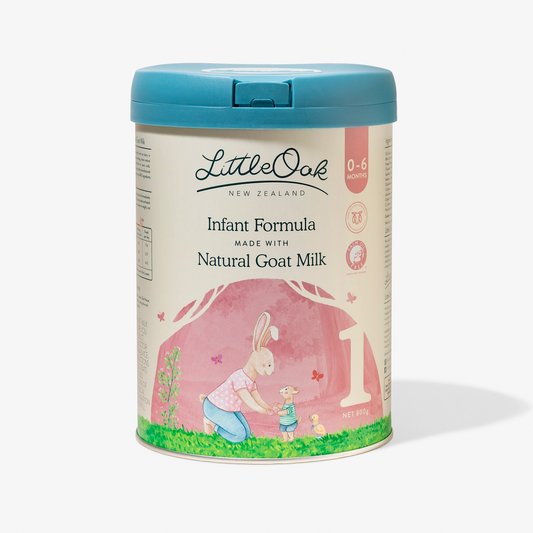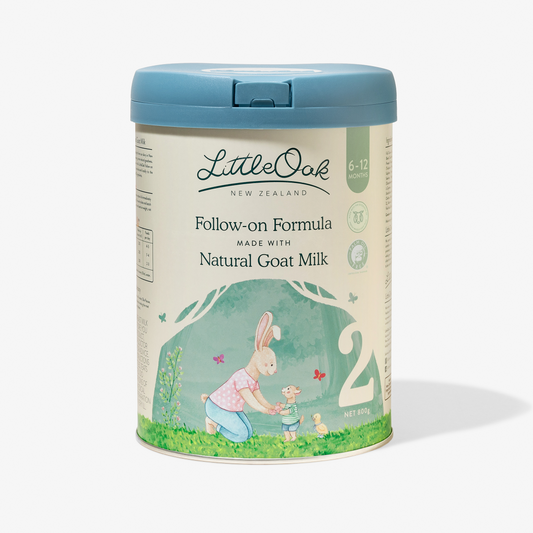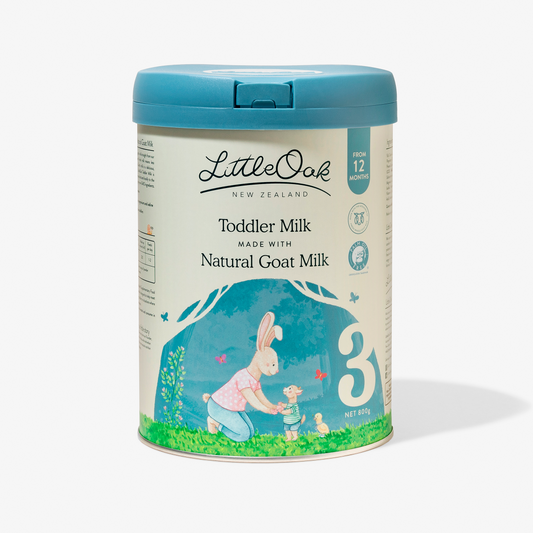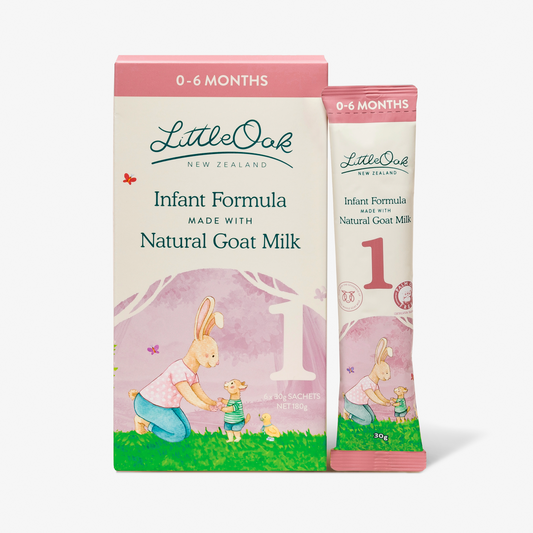
Editor's note: Because of supply chain issues and recalls, formula shortages are affecting many families. For advice on switching and which formulas are currently in stock, see our article Coping With the Baby Formula Shortage? Here's How to Swap Brands.
I've seen so many of you checking out my top picks for organic baby formula – and I’m thrilled it’s been such a hit! One question that keeps popping up in my inbox is: What’s the deal with goat milk formula? Is it better than cow’s milk formula? And which brand should you go for?
Well, let’s dive in! Back in the day, goat milk formula was mostly a European thing or something you'd score through European subscription services. But thanks to the 2022 formula shortage, the FDA green-lit goat milk formulas in the U.S., opening up a whole new world of options for your little one. And guess what? Studies have shown it’s just as nutrient-packed and beneficial as the old-school cow’s milk formula (source).
Now, why consider goat milk formula? For starters, it’s generally easier on the tummy and features a different kind of casein protein (more on that soon!), making it a potential game-changer for those babies who just aren’t vibing with cow’s milk formula. Whenever possible, I always advocate for going organic—whether it’s baby formula or goat milk formula—to dodge GMOs, synthetic goodies, non-organic pesticides, and hormones.
Keep reading to get the full scoop on goat milk-based infant formulas, check out the different brands out there, and discover the best option for your baby’s unique needs!
What Is Goat Milk Formula?
Goat milk formula is a baby formula derived from—yep, you guessed it—goat’s milk instead of the more conventional cow’s milk. It's designed to meet the nutritional needs of little ones who are either fully formula-fed or need a bit of extra nutrition on top of breastfeeding.
And it’s not just for the tiniest members of your family; there are also goat milk toddler formulas perfect for kids between 12-24 months. Some brands even offer early infant options, tailored for the very newest additions (those aged 0-6 months).
Loaded with a mix of vital nutrients like protein, fat, carbs, vitamins, and minerals (hello, iron), goat milk-based formula is crafted to support your baby’s growth and development. Good news—recent studies have shown that goat milk formula for newborns is just as effective and safe as breast milk.
If your baby has a hard time digesting cow's milk or shows signs of an allergy, goat milk formula might be a smart alternative. It’s often considered easier on tiny tummies. However, it's not just for babies with sensitive stomachs. While it’s not a hypoallergenic formula, it’s designed to be a nutritious option for all babies.
So, whether you’re dealing with a milk sensitivity or simply exploring options, goat milk formula could be a hit in your household!
What Are The Benefits Of Goat Milk Formula?
Considering goat milk formula for your baby? It might be a great choice! Here are some of the standout benefits:
- Anti-inflammatory: Goat milk formula is packed with oligosaccharides, the very same goodness found in breast milk. These prebiotic and anti-inflammatory properties help nurture healthy gut bacteria and keep inflammation at bay.
- Digestion: Goat's milk is easier on tiny tummies for several reasons. For starters, it primarily contains A2 proteins instead of A1 proteins, which are known to cause fewer digestive issues. Need more details? Check out our next section! Plus, goat milk proteins form softer curds (much like breast milk) when they meet stomach acid, making it easier for your baby to digest. And those shorter-chain fatty acids in goat’s milk? They’re more readily absorbed than the longer-chained ones in cow’s milk. This all adds up to a gentler option for digestion.
- Eczema: Some recent studies suggest that babies fed goat milk formula might experience fewer eczema flare-ups compared to those on cow’s milk formula.
How Is Goat Milk Formula Different From Cow’s Milk Formula?
Choosing the right baby formula can feel like navigating a labyrinth, but don't worry, we've got your back. Whether you're eyeing goat milk formula or sticking with the classic cow’s milk, we're here to break it down for you—lighthearted yet professional, of course!
Both goat milk and cow’s milk formulas are jam-packed with the essential nutrients your little one needs to thrive. Vitamins, minerals, proteins, fats, and carbohydrates are all checked off the list.
However, there are a few standout differences that might sway you toward the goat side of things:
- Lactose: Goat milk contains less lactose than cow’s milk, making it a bit gentler on tiny tummies, especially for those with lactose sensitivity.
- A2 Protein: Go-go goat! Goat milk is packed with A2 casein protein, compared to the A1 casein in cow’s milk, making it easier for some babies to digest.
- Fat Composition: Goat milk boasts smaller fat globules (medium-chain fatty acids) compared to the long-chain fatty acids in cow’s milk. The result? A formula that’s easier on your baby’s digestive system.
- Nutritional Content: Goat milk naturally shines with vitamin A, calcium, and essential fatty acids. Though cow’s milk formula gets fortified with these good guys, keeping the overall nutritional value neck-and-neck.
- Taste: Goat milk formula tends to have a creamier and sweeter profile, but the flavor can be a bit stronger than cow’s milk. Baby’s preference will be the ultimate decider here.
- Price: Let’s face it, goat milk formula can be a bit pricier than its cow counterpart.
- Availability: Cow’s milk formula has traditionally been more accessible in the U.S. Thanks to the 2022 formula shortage, the FDA green-lighted goat milk-based formula for sale in the U.S., making it more readily available. Plus, popular subscription services have got you covered.
- Sustainability: Goats for the win! Goat milk production is often viewed as more sustainable and ethical. Goats need less land, water, and feed than cows and even lend a hand—or hoof—in wildfire prevention by munching away on overgrown grassy areas.
Whether you opt for goat or cow milk formula, rest assured that both types provide a complete source of infant nutrition. Now go forth and make an informed decision, superstar!
Is Goat Milk Formula Better For Babies?
The answer is: it depends! Goat milk formula might be a game-changer for some little ones, but not for everyone. It's all about individual needs – think allergies, digestive quirks, and nutritional requirements.
Goat milk formula is crafted to offer excellent nutrition for all babies, and some might thrive on it due to its reduced lactose, easily digestible fats, and A2 milk proteins. If your little one struggles with cow milk-based formula, goat milk could be a fantastic alternative. However, some babies might turn their tiny noses up at the taste of goat milk formula or experience constipation when switching from cow milk formula. If your baby is happily guzzling cow milk formula, there's no need to rush into a change.
At the end of the day, the best way to determine if goat milk formula is right for your baby is to chat with your pediatrician and maybe embark on a bit of trial and error.
Ideal Goat's Milk Formula Ingredients
Alright parents, let’s break down what makes the best goat milk formula for your little one. Here’s your checklist:
- Organic or Non-GMO: Aim for organic. If not, at least make sure it’s non-GMO. And if it’s from the EU or New Zealand, even better—the high standards there ensure top-notch animal care and milk processing. Brands like Holle Formulas, Jovie, and HiPP from the EU, and Nanny Care from New Zealand, tick all the boxes.
- Primary Carbohydrate is Lactose: Skip the syrup solids, sugar, glucose syrup, maltodextrin, and any other added sugars. Lactose should be the star because it’s closest to what nature intended.
- 60:40 Whey-to-Casein Ratio: Breastmilk’s perfect 60:40 balance is what we’re aiming to mimic. This ratio helps avoid tummy troubles like gas, constipation, and general baby discomfort. Goat milk naturally has a 20:80 whey-to-casein ratio, so look for formulas that adjust with added goat whey protein or other digestive aids like healthy fats and prebiotics—shoutout to Jovie for doing this right.
- Omega 3 & 6 Fatty Acids: These are essential for brain development and are naturally found in human breast milk. Make sure your chosen formula adds Omega-3 (DHA) and Omega-6 (ARA) fatty acids.
- Prebiotics Added: Prebiotics are amazing for gut health and immune support. While probiotics are nice to have, you can always supplement them if your formula doesn’t include them. Prebiotics are a bit trickier to supplement, so make sure they’re included.
- No Highly Processed Ingredients: This means no carrageenan, soy protein (soybean oil is fine), or any ingredients processed with hexane or glucose syrup solids. Be wary of hexane-extracted DHA; it’s a common culprit.
- Texture Matters: You want a formula that mixes easily and dissolves well. Smooth and creamy formulas are easier on your baby’s tummy, while chalky or lumpy options are a no-go.
- Gluten-Free: Most formulas are naturally gluten-free, but ensure there’s no cross-contamination in manufacturing facilities.
A Quick Note on Palm Oil and Soy Lecithin: These aren't ideal and are more processed, but aren't deal-breakers like glucose syrup solids or GMO ingredients. If you find a formula that checks most of your boxes but includes these two, it’s still a solid choice. Jovie Goat Milk Formula is my top pick because it’s the only one I’ve found that meets all the criteria without palm oil or soy lecithin!
Ingredients to Avoid in Baby Formula
❌ Synthetic DHA and ARA: While DHA and ARA are naturally occurring in breast milk, the synthetic versions in formulas are often extracted using hexane – a process less preferable for your little one. Seek out those extracted using gentler methods like cold extraction.
❌ GMOs: Stick to formulas labeled "non-GMO," and if you're opting for organic, you're in luck—it’s automatically non-GMO. GMOs can be a concern due to their association with genetically engineered crops designed to resist glyphosate (RoundUp), which can find its way into our food.
❌ Carrageenan: Although banned in Europe, carrageenan still appears in some US formulas. This ingredient is notorious for causing intestinal inflammation, which is definitely something you want to avoid for your baby's tummy.
❌ Soy or Soy-Based Products: Excessive soy in infancy might lead to future health issues. It's a good idea to steer clear of soy-based formulas.
❌ Palm Oil: This ingredient can be tricky to avoid as it's prevalent in most US formulas. However, it's worth noting that palm oil isn't the best for the environment and can cause digestive disturbances in some babies. It also hampers the absorption of calcium and fats.
Granola Baby Favorites
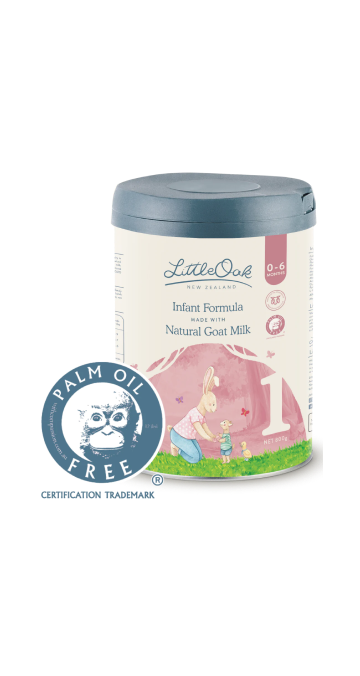
Granola Baby's #1 Organic Formula Choice
1. LittleOak
LittleOak is our #1 choice of formulas sourced and made wholly with organic ingredients. The brand adheres to a stricter European guideline for their formulas, meaning less processing and more natural ingredients. LittleOak products are designed to meet the dietary needs of growing little ones. The formulas are made with fresh whole goat milk straight from dairy in New Zealand, packed with A2 proteins and boasts the world's first certified palm-oil free formula. These all make LittleOak's formulas safe and easy for gassy babies. LittleOak is the all-around best choice for nurturing and growing your little ones from birth to 4 years of age.
Key Product Info:
- The world's first approved palm oil free baby formula
- Made from whole goat milk
- Packed with 16 essential vitamins and minerals (Stage 3)
- Highest concentration of naturally occuring A2 proteins
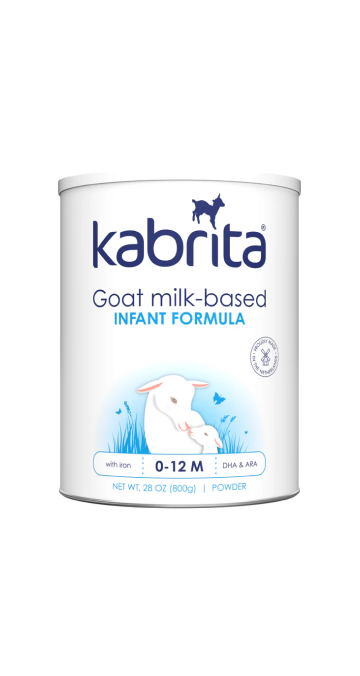
Best All-In-One Formula
2. Kabrita
Kabrita Goat Milk Infant Formula is a gentle and nutritious alternative to cow's milk-based formula, specifically designed to meet the nutritional needs of newborns and infants up to six months of age. Made with high-quality non-GMO goat milk, this formula is naturally easy to digest and gentle on little tummies, making it a great choice for babies with cow's milk sensitivities or digestive discomfort.
- Unique oil blend. Shown to promote more healthy bacteria in the gut, reduce colic and gas, reduce constipation, and allow for better absorption of fat and calcium.
- No GMO ingredients added under EU regulations
- Good carbohydrates & fats to match breastmilk
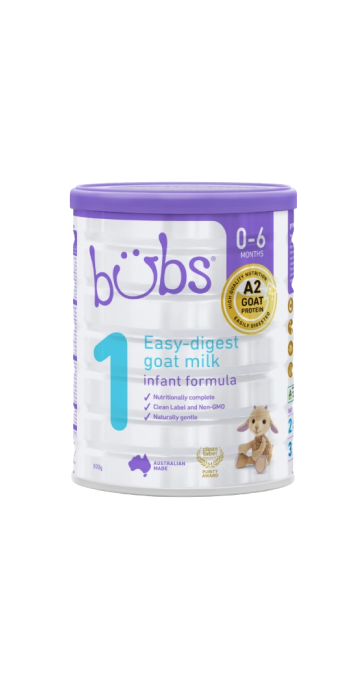
3. Aussie Bubs
Aussie Bubs is a well known baby formula brand that focuses on sourcing organic ingredients. Their formulas are created without additives like palm oil, corn syrup, and added sugars, ingredients that can lead to gassy and sensitive stomachs. Australian goat milk formulated to support gentle digestion for tiny tummies aged 6 to 12 months.
Key Product Info:
- First 1,000 Days and Clean Label Certified
- Naturally occurring A2 protein is easy to digest
- Perfect for toddlers with sensitive tummies.
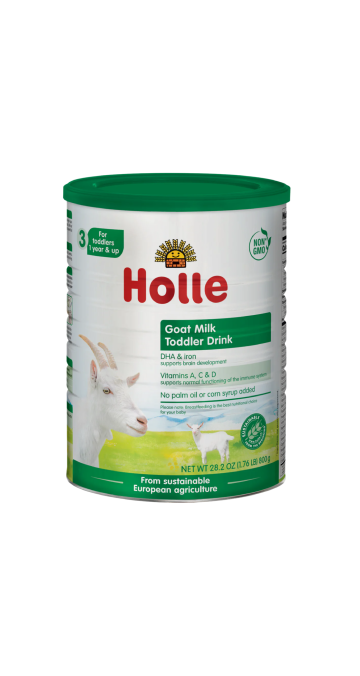
4. Holle
Sourced from Demeter farms with the highest European organic certification, Holle guarantees clean ingredients for your little one's nourishment. With various stages tailored to support infants from newborns to 12+ months, Holle ensures continuous support for your baby's growth and development.
Key product info:
- Certified organic ingredients sourced from biodynamic farms, ensuring the highest standards of purity.
- Smooth texture and natural taste reminiscent of breastmilk, making it a favorable choice for infants.
- Free from starch, suitable for newborns up to 6 months, providing gentle nourishment for delicate tummies.
- Numerous testimonials affirm smooth transitions and enhanced comfort for babies, with reduced instances of spit-up and digestive discomfort, solidifying Holle's reputation as one of the best organic formulas on the market.
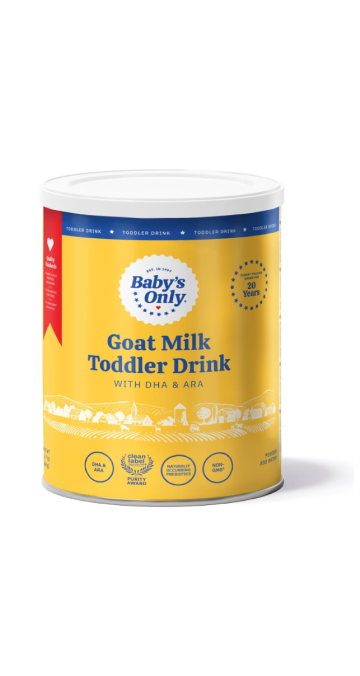
Affordable Pricing
5. Baby's Only
Our Goat Milk Toddler Drink is a gentle alternative to traditional cow milk-based toddler drinks. We developed this non-GMO toddler drink powder without palm oil or corn syrup. It's terrific for toddlers who have sensitive stomachs and trouble digesting traditional cow dairy drinks or formula.
- Clean, nourishing ingredients
- Contains 25 essential nutrients
- Easy to prepare
- Committed to safety
Goat Milk Formula FAQs
Can Babies Drink Goat Milk?
Hold your goats! Regular plain goat milk is not safe for babies under the age of 12 months. It's as different from goat milk formula as apples from oranges. Goat milk formula is specially tweaked to be just right for your little one's nutrition needs, making sure they get the right vitamins, salts, and hydration balance. The same rule applies to cow’s milk – plain cow's milk is a no-go for babies under one year, but cow’s milk baby formula gets the green light. Once your tiny tot blows out that first birthday candle, feel free to gradually introduce goat milk into their diet.
Is Goat’s Milk Formula Safe for Babies?
Absolutely! Goat’s milk formula that’s specifically designed for infants and meets the rigorous nutritional standards set by the FDA or European Commission is A-OK for your baby. These guidelines ensure that the formula has all the nutritional goodness your baby needs. However, always keep your pediatrician in the loop before making any switch, just to be extra sure your baby’s tummy will thank you!
Is goat milk good for milk allergies?
Wondering if goat milk could be your little one’s secret weapon against milk allergies? For some infants, it’s a fantastic alternative, thanks to its unique profile (source). But heads up—babies with severe Cow’s Milk Protein Allergy (CMPA) might still face issues. Goat milk boasts shorter chain fatty acids, a softer curd formation, and a predominance of A2 milk proteins, making it potentially tolerable for 40 to 100% of those who can’t handle cow’s milk.
Can you purchase goat milk formula in the US?
Absolutely, you can! Goat milk formula is readily available in the US. You can snag Kendamil Goat Milk Formula and Bubs Stage 1 Goat Milk Formula right off the shelves at Target. For variety, Kabrita USA is stocked at Whole Foods, Sprouts, and Raley’s. Shopping made easy!
Is goat milk formula FDA-Approved?
Well, that depends on the brand! The only American-made goat milk formula currently authorized by the FDA is Kabrita. Other goat milk formulas from Europe, Australia, or beyond are supervised by their respective regulatory bodies, like the European Commission. Fun fact—some of these regulations can be even stricter than ours! Thanks to Operation Fly Formula, the FDA permits the import of European baby formula brands that satisfy US health and safety standards. So, while they may not be “FDA approved,” they are indeed FDA regulated.
What is the FDA-Approved goat milk formula?
The FDA-approved or authorized goat milk formula is Kabrita. Making history in the summer of 2023, Kabrita became the very first goat milk-based infant formula to earn the FDA’s golden ticket for sale in the United States.
Is goat milk closest to breast milk? What formula is closest to breast milk?
Ah, the age-old question. While goat milk has some cool similarities to breast milk, it’s actually more like cow’s milk than you might think. Here’s the lowdown:
- Natural Prebiotics: Goat milk is packed with natural prebiotics, which is a good start!
- Protein Levels: Similar to human breast milk. Score one for goat milk!
- Lower Lactose: Goat milk has less lactose than both breast and cow’s milk, which can be gentler on tiny tummies.
However (and it’s a big however), the whey-to-casein ratio in goat milk doesn’t quite line up with breast milk’s nutritional profile. That’s why both goat and cow milks need a bit of a makeover—modification and fortification, if you will—when they’re crafted into baby formulas. Think of it as giving them a nutritional upgrade to get them as close to the gold standard of breast milk as possible.
What to consider when buying baby formula
-
Carbohydrates
Experts say most babies do well on formula with lactose (the same sugar in human milk) as the sole carbohydrate
-
Protein
Protein in formula can be either intact or partially or fully broken down, which may be easier for some babies to digest
-
Extra ingredients
All baby formulas must meet the same basic nutritional requirements. Some include extra nutrients like DHA, ARA, and prebiotics
-
Organic
Organic products are important to both adults & babies, especially when choosing between dairy-based formula from cow or goat milk
In conclusion...
Goat milk formula might just be the game-changer you’ve been searching for if your little one struggles with digesting cow milk or has a pesky allergy. Packed with essential nutrients, including vitamins and minerals crucial for your baby’s growth and development, goat milk formula might even be gentler on tiny tummies compared to its cow-based counterpart.
Remember, though, that what works wonders for one baby might not suit another. Each tiny human is unique! When choosing the best formula, factor in the nutritional content, price, availability, texture, and—perhaps most importantly—whether your baby gives it the thumbs-up (or the baby equivalent).
Always have a chat with your pediatrician before switching up formulas. After all, the end goal is a happy, healthy, and well-fed baby!
I hope this guide sheds some light on goat milk infant formulas! Got questions? Drop them in the comments below—I respond to each and every one!
Our Featured Baby Formula
Made from fresh whole goat milk, our beautiful baby formulas and toddler milk support gentle digestion for little tummies - with less processing and more natural goodness. Goat milk is a rich source of nutrients with naturally occurring A2 casein, oligosaccharides and prebiotics.
-
LittleOak Stage 1 Natural Goat Milk Infant Formula (0-6 months)
Regular price $52.95Regular priceUnit price / per -
LittleOak Stage 2 Natural Goat Milk Follow-on Formula (6-12 months)
Regular price $52.95Regular priceUnit price / per -
LittleOak Stage 3 Natural Goat Milk Toddler Drink (12+ months)
Regular price $52.95Regular priceUnit price / per -
LittleOak Stage 1 Natural Goat Milk Infant Formula Sachet (0-6 months)
Regular price $19.95Regular priceUnit price / per
